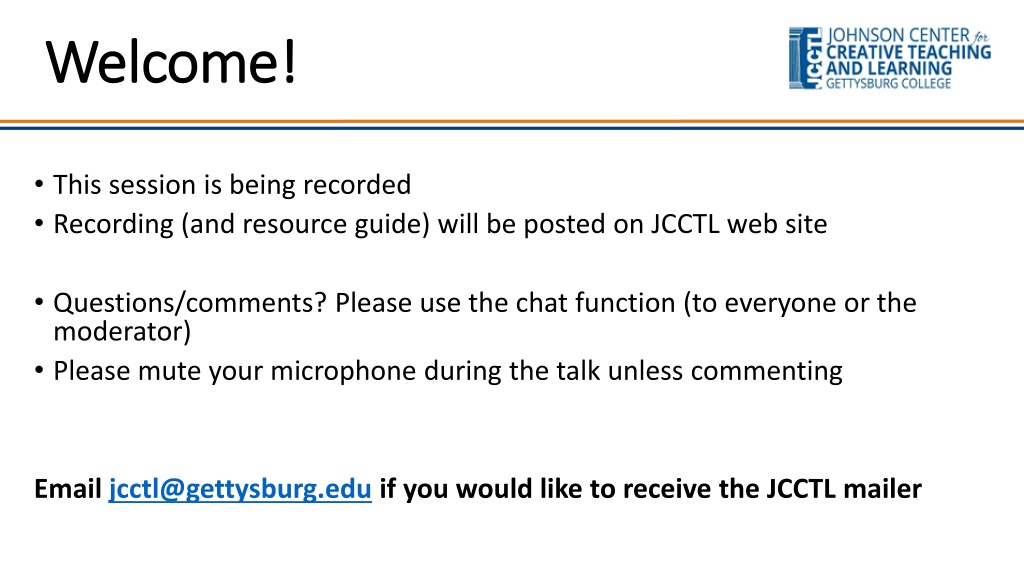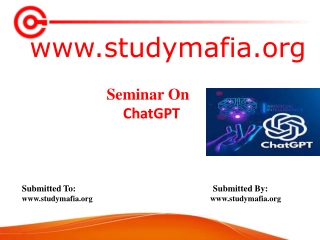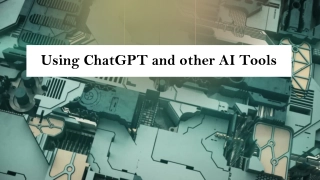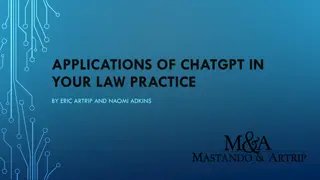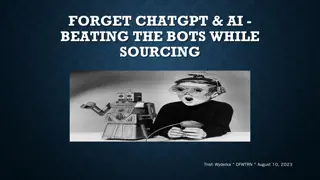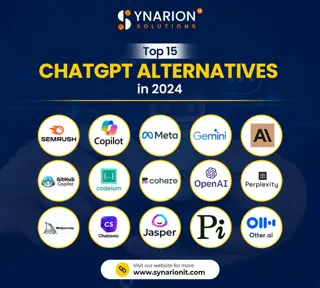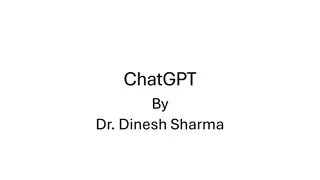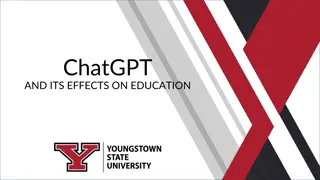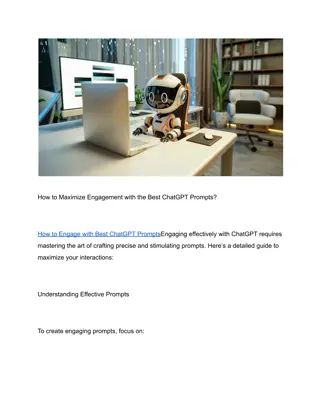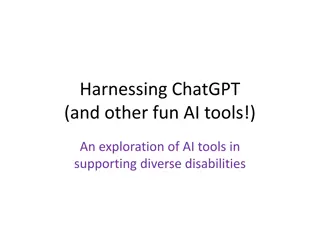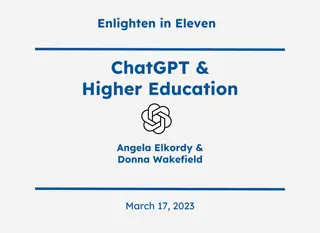ChatGPT: Applications, Limitations, and Ethics
ChatGPT is an AI chatbot that provides answers to questions asked by users. While it can be useful for tasks like essays, coding, or creative work, it also has limitations in accuracy, potential biases, and challenges with detecting its usage. It is important for users to be aware of these limitations and ethical considerations when employing ChatGPT for academic purposes.
Download Presentation

Please find below an Image/Link to download the presentation.
The content on the website is provided AS IS for your information and personal use only. It may not be sold, licensed, or shared on other websites without obtaining consent from the author.If you encounter any issues during the download, it is possible that the publisher has removed the file from their server.
You are allowed to download the files provided on this website for personal or commercial use, subject to the condition that they are used lawfully. All files are the property of their respective owners.
The content on the website is provided AS IS for your information and personal use only. It may not be sold, licensed, or shared on other websites without obtaining consent from the author.
E N D
Presentation Transcript
Welcome! Welcome! This session is being recorded Recording (and resource guide) will be posted on JCCTL web site Questions/comments? Please use the chat function (to everyone or the moderator) Please mute your microphone during the talk unless commenting Email jcctl@gettysburg.edu if you would like to receive the JCCTL mailer
ChatGPT 101 ChatGPT 101 Melissa Forbes, Ph.D. English Department, Writing Center Clif Presser, Ph.D. Computer Science Department
What is ChatGPT? ChatGPT is an artificial-intelligence (AI) chatbot: you ask questions, it sends answers back. An oversimplified example of a language model. ChatGPT's Model. Data Training It is NOT search.
What does this look like in action? https://chat.openai.com/chat https://chat.openai.com/chat
What can students use ChatGPT for? Essays, take-home questions, creative work Coding, calculations Code and Proof Example: http://cs.gettysburg.edu/~cpresser/jcctl/
Limitations Accuracy Can be confidently wrong "coherent nonsense" (Hunter, 2021); "completely credible-, accurate-sounding bullshit" (Raicu, in Tran 2023) Guesses rather than asking clarifying questions False sources/citations (for now) Follows the majority opinion Bias Perpetuates stereotypes, unfair discrimination, exclusionary norms, toxic language, and lower performance by social group (Weidinger et al.), notably bias against Muslims (Farooqi and Zou, 2021) Circular, superficial writing "stochastic parrots" (Bender et al. 2021) Boring
Limitations, continued Content and quality Training ends in 2021 Bad with images/video Bad with citations Bad with original insight
Will I know if students use GPT Chat? Probably. AI Detection software such as GPTZero Honor code? Inaccuracies Boring and circular
Will I know if students use GPT Chat? Probably. AI Detection software such as GPTZero Honor code? Inaccuracies Boring and circular But also, it depends.
What now? Questions to consider: Why am I assigning writing in the first place? Demonstrate content knowledge Generate insights/make connections Learn to write What are the learning goals of these assignments, and how might ChatGPT interfere with them (or not)? Does ChatGPT make any new learning goals possible?
And as you ask yourself these questions, ... Points to consider: The horse is out of the barn Outside of educational environments, AI is being adopted as a tool With a complex prompt, cheating effectively with ChatGPT is often more difficult than just doing the assignment This is not new
"For this invention will produce forgetfulness in the minds of those who learn to use it, because they will not practice their memory. Their trust in writing, produced by external characters which are no part of themselves, will discourage the use of their own memory within them. You have invented an elixir not of memory, but of reminding; and you offer your pupils the appearance of wisdom, not true wisdom, for they will read many things without instruction and will therefore seem to know many things, when they are for the most part ignorant and hard to get along with, since they are not wise, but only appear wise." Socrates, Phaedrus 14, 274 275
Is using ChatGPT a valuable skill? Define and refine You will get what you ask for, even if it s hard to tell what you re asking for.
Which approach fits best? Can students use ChatGPT to complete your assignments? NO YES No way Is that ok with you? (learning outcomes) Maybe, but only in specific ways Yes, as long as they don't do XYZ Love it; let's use it as full resource
No way Maybe, but only in specific ways - Create "ChatGPT-proof" assignments - Test your own assignments - Exploit ChatGPT's current weaknesses - Multiple drafts & feedback - Process > product - Higher order > lower order - Collaborative/ungrading - Critical AI Design assignments/pedagogical approaches that incorporate ChatGPT into their content or process Consider adapting learning outcomes to reflect lifting done by AI - - Clarity and transparency: - Make students aware of ChatGPT - Clearly state your policy in rubric - Let students know AI detectors exist - Discuss reasoning behind choices - Ask to disclose ChatGPT use? - Other recommendations? - Discuss where tool use becomes cheating - - Ask them to acknowledge use of AI Consider adapting learning outcomes to reflect lifting done by AI Highlight the value of personal effort for you and why - Consider adapting learning outcomes to reflect lifting done by AI - Yes, as long as they don't do XYZ Love it; let's use it as full resource
Follow-up Resource guide will be updated within 24 hours notice via JCCTL mailer (jcctl@gettysburg.edu) and Digests What will help you? Resource repository? Work with colleagues? Working groups? Teaching squares? Come to class? Please let us know so we can serve you best. Thank you!
